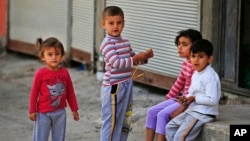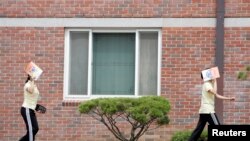As European countries struggle to cope with over a million migrants who have escaped the ongoing violence in the Middle East, a relatively small number of Syrians have sought protection in South Korea.
But only a few have been officially recognized as refugees. Most receive so-called humanitarian visas that allow them to live in the country without financial support, housing or health care.
Government figures show that since 1994, 1,144 Syrians have requested asylum in South Korea, but refugee status has been granted to only three.
One of those Syrians whose application was rejected is 23-year-old Ahmed Lababidi, who lives on Jeju Island, an hour flight south of Seoul. He and his younger brother fled their hometown Aleppo in 2012 and later came to South Korea on temporary business visas.
But when Lababidi applied for asylum at a local immigration office, he says he was told that fleeing war is not grounds by itself for refugee status in South Korea.
"They just say you are not a refugee," he said the official told him. "Because it's just war, you can stay here, but not as a refugee."
Lababidi adds that the agent told him a condition for asylum is contingent on showing proof his life would be in danger if he returned to Syria.
"I had some activities on Facebook, anti-government, they know my name," he said he told the official, but to no avail.
UN treaty
Some observers accuse South Korea of not fulfilling its commitment as a signatory of the United Nations Convention relating to the Status of Refugees, a treaty that defines who is a refugee and what responsibilities a host nation has in providing for that individual.
"Clearly Seoul is reluctant to undertake those obligations except for in the most clear-cut cases," said Phil Robertson, deputy director of Human Rights Watch's Asia division.
Robertson said South Korea's humanitarian visas are an "artificial category" that "gives less rights" to asylum seekers, noting that Japan, too, has come under similar criticism in regard to its refugee policy.
"Both Japan and South Korea are relatively wealthy societies that could afford to provide resettlement assistance to refugees," he said. "There is a reluctance to have refugees become a part of that society."
Robertson points out that South Korea's policies toward Syrian or other asylum seekers stand in stark contrast to its generous resettlement program for North Korean defectors. He said it is hypocritical for Seoul to call on other nations to protect North Korean escapees when it does not offer the same treatment to refugees within its own borders.
Koreans vs. outsiders
The South Korean constitution grants North Koreans full citizenship once they step foot onto the country's soil because Seoul does not technically recognize the authority of the Pyongyang government.
Additionally, many South Koreans do not consider North Koreans as foreigners because they are "of the same race," said Chung Shin-young, an immigration lawyer in Seoul.
She said South Korea, a generally homogenous country, has difficulty accepting non-Korean refugees due to their "different skin color or culture." This prejudice is especially challenging for Muslim asylum seekers since some Korean politicians, media and law enforcement have tried to make a connection between these migrants and terrorism, Chung added.
An official at South Korea's Ministry of Justice, who asked not to be named per office rules, said all asylum applications are "evaluated fairly" and consideration is given based on the circumstances in their home country as well as evidence of persecution.
Syrian Ahmed Lababidi said the immigration office has not told him how many times or for how long he can renew his humanitarian visa. He said he's grown very comfortable in his new home on the island, but other options have crossed his mind.
If his parents, who are now in Turkey, get refugee status in Europe, "maybe I can go with them," Lababidi said. "But I just want to live on Jeju."





